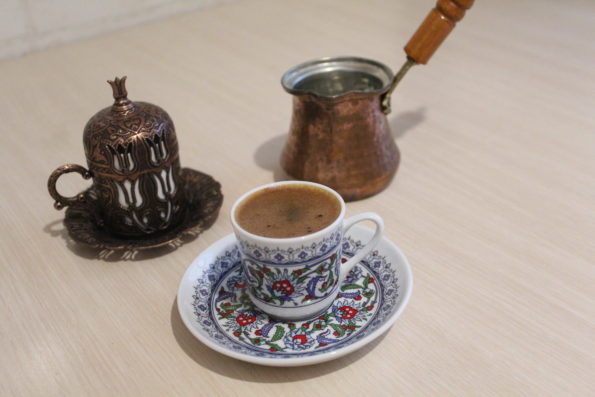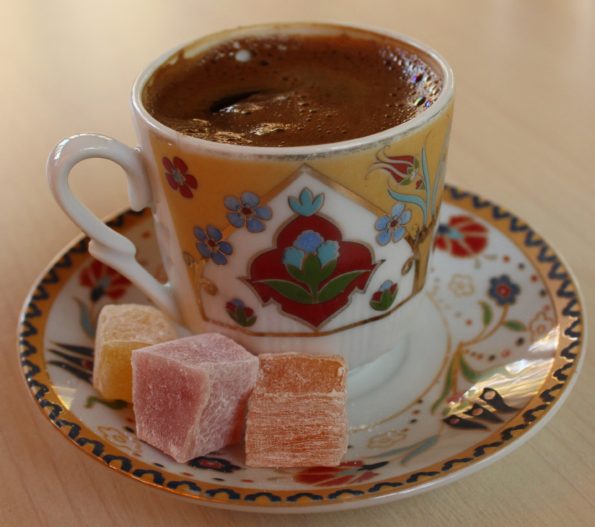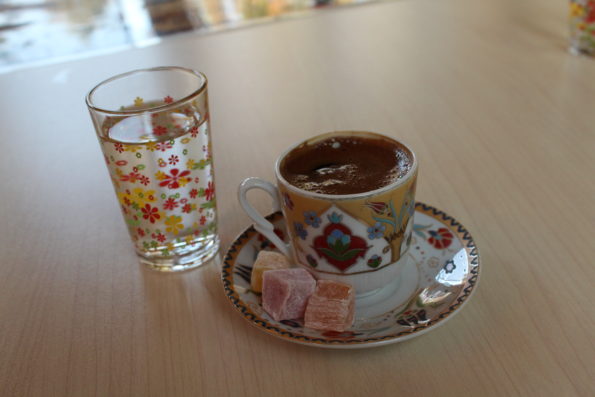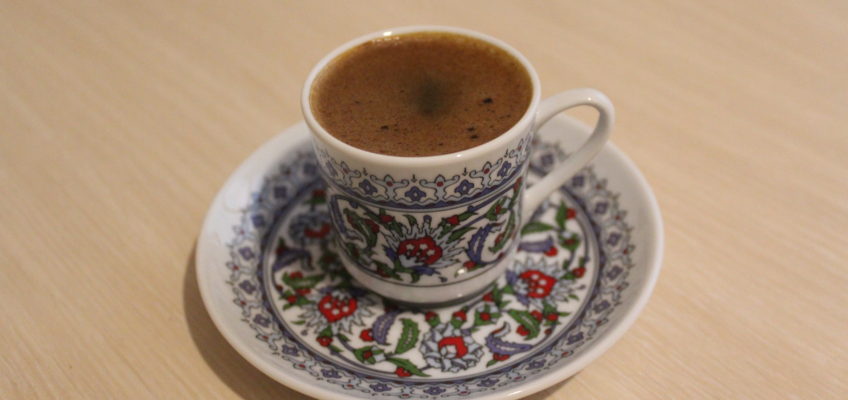Much more than a beverage
As a famous Turkish proverb states, “The heart seeks neither coffee nor coffeehouse. The heart wants conversation and friendship, coffee’s an excuse.” So how did coffee become such an important part of Turkish culture? There are so many legends surrounding the start of coffee consumption that it is hard to know exactly what is truth. However, it is believed that a goat shepherd, named Kaldi, in Ethiopia was the first to discover the coffee berry when he noticed increased energy in his flock of goats after eating these mysterious red berries. Curious as to the reason, he ground some of the berries in a mortar, mixed them with animal fat, and rolled the paste into a ball for convenient portability. The combination of caffeine, sugar and fat caused Kaldi to have enough energy to stay up with his flock of goats all night long. It is believed that he brought the coffee berries to an Islamic monastery but the monks, disapproving of the effect, threw them on the fire. As the berries roasted in the fire they appreciated the delicious aroma and quickly gathered the roasted coffee out of the ashes, ground them down and then diluted them with water. These “energizing berries” gained popularity quickly. Coffee was given its name because the Arabic word qahwa means “that which prevents sleep” or “wine.” The newly discovered coffee drink was appreciated by ancient practitioners of Sufism, a mystical sect of Islam. It was discovered that they could stay awake for their nightly prayers and remain energetic during the twirling, hypnotic dances once drinking coffee was added to their daily ceremonies.
 As drinking coffee began to spread and gain popularity among religious sects it also found its way to the Ottoman courts in Constantinople and was enjoyed by the sultans in the mid-16th century. It is said that Suleiman the Magnificent was so enamored with this new black drink that up to forty assistants where needed to properly serve him coffee. After roasting the coffee beans, his cuisine staff would grind the beans very finely. Afterwards they boiled the coffee powder with water in a special coffee pot known as a cezve (pronounced jez-vay) as pictured here. In fact the term “Turkish Coffee”, which we use today, indicates the preparation method of the brew as those in the Sultan’s palace were first to grind the roasted beans so finely to make the perfect “black drink.” A recipe for Turkish Coffee which you can make yourself can be found here.
As drinking coffee began to spread and gain popularity among religious sects it also found its way to the Ottoman courts in Constantinople and was enjoyed by the sultans in the mid-16th century. It is said that Suleiman the Magnificent was so enamored with this new black drink that up to forty assistants where needed to properly serve him coffee. After roasting the coffee beans, his cuisine staff would grind the beans very finely. Afterwards they boiled the coffee powder with water in a special coffee pot known as a cezve (pronounced jez-vay) as pictured here. In fact the term “Turkish Coffee”, which we use today, indicates the preparation method of the brew as those in the Sultan’s palace were first to grind the roasted beans so finely to make the perfect “black drink.” A recipe for Turkish Coffee which you can make yourself can be found here.
This new brew found enormous popularity with Turkish Sultans in the Ottoman courts. Royal coffee makers, known as kahveci usta, conducted elaborate coffee ceremonies. However, it wasn’t only nobility who enjoyed the rich brew. Turkish men would actually consider the possibility of a woman to be their potential wife based on her coffee brewing abilities. (More about that at the end of the article.) Coffee was such a valuable commodity in the Ottoman empire that there was even a law giving women the right to divorce their husbands if they could not provide them with their daily coffee allowance!
The first coffeehouse was opened in the modern-day city of Istanbul in 1555 and quickly grew in popularity and multiplied rapidly throughout the region. Unlike the modern coffee shop which has a long line of impatient customers waiting to quickly order their drink on their way to work, these early coffeehouses were meeting places. Men would gather in these coffeehouses to discuss local news or politics. Others would gather to play games like backgammon while slowly sipping the rich brew. History notes that coffeehouses were popular places for business meetings to be conducted. In fact by 1656 the popularity of meetings in these coffeehouses became such a threat to the Ottoman Sultan that he issued laws to close coffeehouses and made drinking coffee illegal! While the public was shocked and responded with riots which eventually lifted the ban, original punishments for gathering to drink coffee included beating and even drowning! However, because the political conversations and gatherings occurring in coffeehouses posed such a threat to the Empire, the Sultan placed heavy taxes on such establishments meant to discourage such gatherings in an attempt to snuff out the early flames of rebellion.
 A famous Turkish proverb states that “Coffee should be black as hell, strong as death, and sweet as love.” (Kahve cehennem kadar kara, ölüm kadar kuvvetli, sevgi kadar tatlı olmalı.) If you have ever had the pleasure of enjoying a small cup of Turkish coffee you can easily imagine the first two parts of this saying. However, what about love? As alluded to previously, being able to brew the perfect cup of Turkish coffee is an important skill any Turkish girl wishing to marry must acquire. It has been said that if the bride could make a good coffee for her in-laws-to-be, then she would make a good wife. The groom and his family observe the bride’s coffee making and serving ability before agreeing to a marriage. In Ottoman times, the Sultan’s harem spent hundreds of hours training women on the fine art of brewing and serving coffee. However, not all of the pressure is on the girl during a coffee drinking ceremony to ensure wedded bliss. Traditionally, when the groom’s parents visit the bride’s family to ask for the soon-to-be bride’s hand and blessings from her parents, the bride serves Turkish coffee sweetened with sugar to everyone except the groom. She uses salt instead of sugar in the groom’s cup. If the groom drinks the entire cup of salted coffee without making a face he has proven his manliness and shows that he is ready to marry her. It is believed that this interesting tradition started when Osman Fevzi’s bride accidentally used salt instead of sugar when serving her guests. In order to preserve her honor and not cause her shame, her perspective groom drank everything without making a face, unlike the other guests who were not impressed. She realized her mistake and was horribly embarrassed, but her groom raved about how much he liked it and, in front of all the guests, asked her to continue making salty coffee for him after their marriage. Doing this he proved a groom should always be happy and honor his bride, even if the coffee is bitter (or salty!) as that ensures the couple will have a long and happy marriage. After learning this interesting tradition, I reenacted this ceremony with my friends and family in the US using my grandparents as the bride and groom. They were celebrating their 60th wedding anniversary which was the cause of our gathering. I am proud to say my grandfather drank down that entire cup of salty coffee… not that you would expect much less after 60 years of commitment and sacrifice.
A famous Turkish proverb states that “Coffee should be black as hell, strong as death, and sweet as love.” (Kahve cehennem kadar kara, ölüm kadar kuvvetli, sevgi kadar tatlı olmalı.) If you have ever had the pleasure of enjoying a small cup of Turkish coffee you can easily imagine the first two parts of this saying. However, what about love? As alluded to previously, being able to brew the perfect cup of Turkish coffee is an important skill any Turkish girl wishing to marry must acquire. It has been said that if the bride could make a good coffee for her in-laws-to-be, then she would make a good wife. The groom and his family observe the bride’s coffee making and serving ability before agreeing to a marriage. In Ottoman times, the Sultan’s harem spent hundreds of hours training women on the fine art of brewing and serving coffee. However, not all of the pressure is on the girl during a coffee drinking ceremony to ensure wedded bliss. Traditionally, when the groom’s parents visit the bride’s family to ask for the soon-to-be bride’s hand and blessings from her parents, the bride serves Turkish coffee sweetened with sugar to everyone except the groom. She uses salt instead of sugar in the groom’s cup. If the groom drinks the entire cup of salted coffee without making a face he has proven his manliness and shows that he is ready to marry her. It is believed that this interesting tradition started when Osman Fevzi’s bride accidentally used salt instead of sugar when serving her guests. In order to preserve her honor and not cause her shame, her perspective groom drank everything without making a face, unlike the other guests who were not impressed. She realized her mistake and was horribly embarrassed, but her groom raved about how much he liked it and, in front of all the guests, asked her to continue making salty coffee for him after their marriage. Doing this he proved a groom should always be happy and honor his bride, even if the coffee is bitter (or salty!) as that ensures the couple will have a long and happy marriage. After learning this interesting tradition, I reenacted this ceremony with my friends and family in the US using my grandparents as the bride and groom. They were celebrating their 60th wedding anniversary which was the cause of our gathering. I am proud to say my grandfather drank down that entire cup of salty coffee… not that you would expect much less after 60 years of commitment and sacrifice.
After all that goes into preparing a cup of Turkish coffee, it is easy to understand why they say that to “prepare a Turkish coffee is to make a friend for life.” Another popular Turkish proverb is: Bir fincan kahvenin kırk yıl hatırı vardır. “Drinking a cup of coffee together commits one to forty years of friendship.” As mentioned before, coffee is not something one waits in line for individually; it is a social event meant to be enjoyed with a group of friends. In Turkey, drinking coffee isn’t simply because you need a wake-up call, but a symbol of hospitality, friendship and respect. Its special brewing technique and rich communal culture made it worthy of being confirmed in 2013 by UNESCO as an Intangible Cultural Heritage of Humanity – a recognition confirming Turkish coffee as an part of the world’s heritage.
Patience is the key to perfecting Turkish Coffee, both in preparing it and in savoring it. Freshly brewed Turkish Coffee should have a thick layer of froth on top. Since all of the grounds are dumped into your cup of coffee, you must wait for the grounds to settle and slowly sip the brew which will be rich and creamy in your mouth. If you make the mistake of many Westerners and chug the coffee in quick gulps, you will be picking grounds out of your teeth for a long time. Instead, slowly sip your coffee while enjoying friendship and conversation. Don’t rush it! Sit, sip, enjoy the chat.
 A popular method of fortune telling happens after you have drained the brew. Because of the thick layer of grounds remaining in the bottom of the cup, many people will close their cup with the saucer, make a wish and then turn it over. Once the cup has cooled, the shapes it leaves on the side of the cup can be read, usually by a falcı (fortune teller). Whether enjoying Turkish coffee in a café or in someone’s home, it is always served with a glass of water to refresh your taste buds. Since the strong brew can be slightly bitter, a small square of Turkish Delight or Baklava is the perfect compliment to Turkish Coffee. The small sweet served with your cup of Turkish Coffee helps take the edge off of the strong brew. Finishing with this small sweet bite will capture the essence of the black coffee without leaving a strong and bitter taste in your mouth.
A popular method of fortune telling happens after you have drained the brew. Because of the thick layer of grounds remaining in the bottom of the cup, many people will close their cup with the saucer, make a wish and then turn it over. Once the cup has cooled, the shapes it leaves on the side of the cup can be read, usually by a falcı (fortune teller). Whether enjoying Turkish coffee in a café or in someone’s home, it is always served with a glass of water to refresh your taste buds. Since the strong brew can be slightly bitter, a small square of Turkish Delight or Baklava is the perfect compliment to Turkish Coffee. The small sweet served with your cup of Turkish Coffee helps take the edge off of the strong brew. Finishing with this small sweet bite will capture the essence of the black coffee without leaving a strong and bitter taste in your mouth.
(Stay tuned for part 2 of this story which will describe the various coffees enjoyed in various parts of Turkey.)



Victoria
Excellent article!
Julene
This is such a great article! It really helps me understand a lot more about the history of coffee – but in an interesting way! Thanks so much!